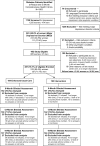Collaborative care management of major depression among low-income, predominantly Hispanic subjects with diabetes: a randomized controlled trial
- PMID: 20097780
- PMCID: PMC2845010
- DOI: 10.2337/dc09-1711
Collaborative care management of major depression among low-income, predominantly Hispanic subjects with diabetes: a randomized controlled trial
Abstract
Objective: To determine whether evidence-based socioculturally adapted collaborative depression care improves receipt of depression care and depression and diabetes outcomes in low-income Hispanic subjects.
Research design and methods: This was a randomized controlled trial of 387 diabetic patients (96.5% Hispanic) with clinically significant depression recruited from two public safety-net clinics from August 2005 to July 2007 and followed over 18 months. Intervention (INT group) included problem-solving therapy and/or antidepressant medication based on a stepped-care algorithm; first-line treatment choice; telephone treatment response, adherence, and relapse prevention follow-up over 12 months; plus systems navigation assistance. Enhanced usual care (EUC group) included standard clinic care plus patient receipt of depression educational pamphlets and a community resource list.
Results: INT patients had significantly greater depression improvement (> or =50% reduction in Symptom Checklist-20 depression score from baseline; 57, 62, and 62% vs. the EUC group's 36, 42, and 44% at 6, 12, and 18 months, respectively; odds ratio 2.46-2.57; P < 0.001). Mixed-effects linear regression models showed a significant study group-by-time interaction over 18 months in diabetes symptoms; anxiety; Medical Outcomes Study Short-Form Health Survey (SF-12) emotional, physical, and pain-related functioning; Sheehan disability; financial situation; and number of social stressors (P = 0.04 for disability and SF-12 physical functioning, P < 0.001 for all others) but no study group-by-time interaction in A1C, diabetes complications, self-care management, or BMI.
Conclusions: Socioculturally adapted collaborative depression care improved depression, functional outcomes, and receipt of depression treatment in predominantly Hispanic patients in safety-net clinics.
References
-
- Li C, Ford ES, Strine TW, Mokdad AH. Prevalence of depression among U.S. adults with diabetes: findings from the 2006 behavioral risk factor surveillance system. Diabetes Care 2008;31:105–107 - PubMed
-
- Lanting LC, Joung I, Mackenbach JP, Lamberts SW, Boostma AH. Ethnic differences in mortality, end-stage complications, and quality of care among diabetic patients. Diabetes Care 2005;28:2280–2288 - PubMed
-
- Pinto-Meza A, Fernandez A, Serrano-Blanco A, Haro JM. Adequacy of antidepressant treatment in Spanish primary care: a naturalistic six-month follow-up study. Psychiatr Serv 2008;59:78–83 - PubMed
-
- Kirk JK, Passmore LV, Bell RA, Narayan KM, D'Agostino RB, Jr, Arcury TA, Quandt SA. Disparities in A1C levels between Hispanic and non-Hispanic white adults with diabetes: a meta-analysis. Diabetes Care 2008;31:240–246 - PubMed


